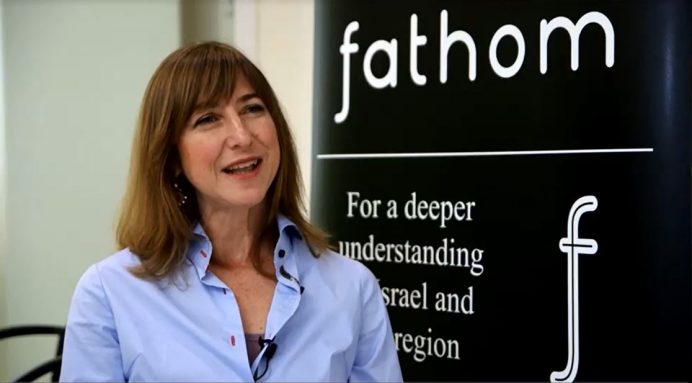Dr. Dahlia Scheindlin is a public opinion expert who has advised five national campaigns in Israel and in 15 other countries; she is a founding writer on +972 Magazine, co-host of the Tel Aviv Review podcast and formerly an adjunct lecturer at Tel Aviv University. In this conversation with BICOM CEO James Sorene, Scheindlin discusses how the Israeli public defines itself and argues that the key to the centre-left winning the elections will be convincing members of the Moderate Right to switch blocs. This piece was originally published in March 2019.
Viewing the public through the lens of the blocs
The way the Israeli people self-identify – as Right, Centre or Left – is still the best predictor in how people will vote in the elections. Yet when we talk about which party will win and what coalition they might form, the most important thing is to look at the blocs, namely Right, Left and Centre and to understand the numbers. When we ask people whether they consider themselves to be Firm Right, Moderate Right, Firm Left, Moderate Left, or Centrist, the responses are very consistent. The largest proportion of people – 45 per cent of the entirety of Israeli society rather than just those who vote – self-identify as right-wing (Firm Right and Moderate Right); about 25 to 28 per cent consider themselves Centrist; and about 20 per cent Left. When the Left and Centre are combined, for example, when those parties are together in the opposition which is what happened after the 2015 elections, there is almost parity between the blocs.
However, when you look at the breakdown among those who actually turn out to vote, the Arab community votes in significantly lower numbers (they account for roughly 10 per cent of the vote, despite comprising 20 per cent of the population). For this reason it is important to understand the ideological self-definition among Jewish voters, which changes the balance between the blocs. The breakdown among Jews can reach up to 55 per cent for the Firm Right/Moderate Right, 25 to 30 per cent Centrist, and Left drops down to 15 per cent. And it is these numbers that were reflected in the last Knesset where there were 66 MKs from the Right versus 54 from the Opposition.
Until those numbers significantly change, it’s very hard to see how there will be a change in the dynamics of the next coalition, even if the parties themselves reconfigure. Even when parties merge or reform, for the most part Israelis have a clear sense of which side of the bloc they belong to.
Trying to shift members of the Moderate Right
There will not be a major change in the composition of the next government without a noticeable shift in Moderate Right voters to a different bloc. But this group is actually quite large. If you look at the 45 per cent who comprise the Total Right, its two components, the Firm Right and Moderate Right break down pretty evenly. This makes the Moderate Right approximately a quarter of the voting population, or approximately half of the Total Right.
There is a significant difference between the Firm Right and Moderate Right on most issues, such as their approach to the two state solution, religion and state, national identity issues. The question is, who out of those in the Moderate Right would consider a) shifting parties and also b) shifting across blocs.
Benny Gantz has reached out to those people by emphasising his security credentials and his actions in Gaza and he seems to think that will appeal to the Moderate Right. Whether it will or not is unclear, but he certainly understands that without that shifting between blocs there will not be a change of government.
The Bibi factor
Likud has generally been very stable. But Netanyahu is facing certain vulnerabilities, not just regarding the Attorney General’s (AG) announcement. In terms of his political positioning, Netanyahu has had the exclusive territory of being ‘Mr Security’. No matter how much people criticise him around the dinner table, the fact is that the right wing feels safer with Netanyahu. However, that becomes less of an exclusive image when you are facing down three former Chiefs of Staff.
But how many people will this specific issue actually affect? One would have to be both sceptical of Netanyahu, annoyed at the corruption charges, tired of his populist leadership and voting solely based on security issues to turn to Gantz – a very small subsection of right-wing voters. Many on the Right who vote for Netanyahu don’t just see him as Mr Security – they also see him as a states-person, a very savvy politician. The one arena left where Netanyahu has an exclusive and strong image in the eyes of the electorate is his foreign policy, statesmanship and ability to connect with the Americans (he even knows how to ‘speak Trump’). While he is very reticent about discussing his endgame for the Israeli-Palestinian conflict he never fails to mention how important it is that he’s opened up relations with Chad, or that he’s close to Indian Prime Minister Modi, or that he holds meetings with Putin – even the fact he postponed his latest one and held it a week later, shows how confident he is on the international stage. People see Netanyahu as someone who can really manoeuvre the global situation. In this context it becomes harder to see people voting for him exclusively for the security image. That’s why I don’t have strong evidence for why people would leave Likud en masse when they’ve been so stalwart in supporting Netanyahu in surveys since the 2015 election.
The AG’s announcement hasn’t had a discernible impact
Based on previous evidence, I’m not convinced there will be a massive defection following the AG’s decision. The only comparable situation is the police recommendation from February 2018 that Netanyahu be indicted in Case 1,000 and 2,000 after which Netanyahu’s poll numbers rose. They were hovering between 25 to 28 seats, and then rose and stayed above 30 seats. It might have been the case that the more severe charge of bribery in Case 4,000 would have in impact. But most polls that have appeared since the AG announced his decision to indict the Prime Minister pending a hearing, show what was expected: overall stability for Likud. In other words, no discernible impact so far.
The Jewish Home/Jewish Power merger
The merger between Jewish Home and Jewish Power is an important story for the Right. But I think most analysts are getting the merger wrong. People think it’s interesting there is a consolidation on the right. But the fact is that we now have two parties (Jewish Home and New Right led by Naftali Bennett and Ayelet Shaked) appealing mostly to a single constituency of national religious voters – this group had only one party as its main representative in 2015 (Jewish Home). So the right is somewhat divided.
Jewish Power is considered extreme even among the Israeli right. But the main issue is whether there are Likud voters or people on the Firm Right or Moderate Right who would have voted within the right-wing bloc in the elections but who will now will now ‘defect’ in order to try and prevent the possibility of having Michael Ben-Ari of Jewish Power as a Minister in the next government? That scenario is a possibility, but I’m not sure how common that attitude will be. It is more likely that some people on the Moderate Right may believe things have gone too far. These people are right-wing on security and national identity – and probably supported the Nation State Law – but are repulsed by what Jewish Power represents. Still it’s not clear how many of them will leave the bloc for that reason.








































